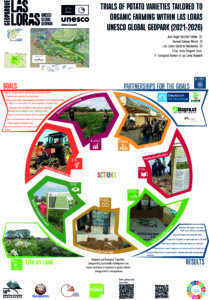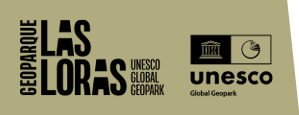EGN2022 Conference-Poster
TRIALS OF POTATO VARIETIES TAILORED TO ORGANIC FARMING WITHIN LAS LORAS UNESCO GLOBAL GEOPARK
Sánchez Fabián José Ángel1, Salman Monte Karmah1, Calderón Mediavilla Luis Javier2
Las Loras Geopark Team1, Ecological farmer of Las Loras Geopark2
Key words: organic farming, agroecology, geopark, potato.
The prevailing intensive farming models have a high environmental impact both in what relates to biodiversity loss and the impact on climate change. According to the Intergovernmental Panel on Climate Change, 14% of the total greenhouse gas emissions are owed to these models. Agroecology is a viable alternative which positively impacts on climate change. Agroecological production not only produces less greenhouse effect gases, but it also increases the soil carbon sequestration capacity, provides high quality healthy food and it is a key activity in fighting against depopulation.
Given the importance of the production of seed potatoes inside the Geopark, the “Field trials of potato varieties tailored to organic farming within Las Loras UNESCO Global Geopark” five-year project has been launched with the aim of improving the production of seed potatoes, assessing the most suitable varieties for cultivation in the region and showing the characteristics and feasibility of agroecological production models to local farmers, enhancing the transition from the currently dominant intensive patterns to sustainable ones.
The first-year assessment is highly positive. Beyond the outcomes of the trials, which will be completely assessed throughout the five-year period, the results concerning the project’s dissemination and impact have been impressive.

